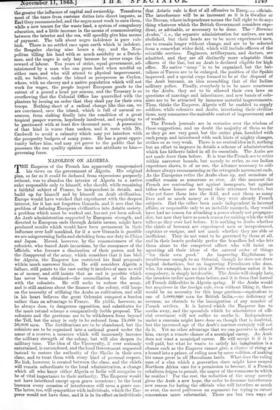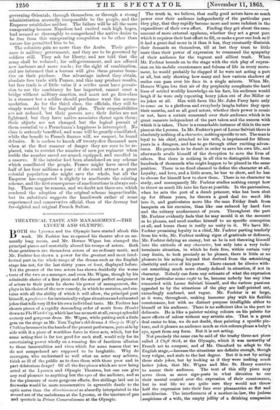NAPOLEON ON ALGERIA.
THE Emperor of the French has apparently compromised his views on the government of Algeria. His original plan, so far as it could be deduced from expressions purposely reticent, was to abandon the interior of Algeria to a native ruler responsible only to himself, who should, while remaining a faithful subject of France, be independent in details, and build up for himself and by himself an Arab civilization. Europe would have watched that experiment with the deepest interest, fOr it has not forgotten Granada, and it sees that the problem of infusing European civilization into Asiatic society, a problem which must be worked out, has not yet been solved. An Arab administration supported by European strength, and directed to European ends through Asiatic means, might have produced results which would have been permanent in their influence over half mankind, for if a new Granada is possible we are misgoverning India and shrinking from our duty in China and Japan. Moved, however, by the remonstrances of the colonists, who feared Arab incursions, by the annoyance of the Officials, who foresaw a diminution of their power, and by the disapproval of the army, which considers that it has bled for Algeria, the Emperor has restricted his final proposals within much narrower limits. He still considers Algeria a failure, still points to the vast outlay it involves of men as well as of money, and still insists that an end is possible which has never been obtained—the reconciliation of the Arabs with the colonists. He still seeks to reduce the army, and is still anxious about the finance of the colony, still harps on the necessity of utilizing the Arabs as cultivators, and still in his heart believes the great Orleanist conquest a burden rather than an advantage to France. He yields, however, as he always does, to dangerous opposition, and substitutes for the more rotund scheme a comparatively feeble proposal. The colonists and the garrisons are to be withdrawn from beyond the Tell, but the army is only to be reduced from 75,000 to 50,000 men. The fortifications are to be abandoned, but the colonists are to be organized into a national guard under the name of a reserve, a measure which will immensely increase the military strength of the colony, but will also deepen its military tone. The idea of the Viceroyalty, if ever seriously entertained, is surrendered, and the local Government requested instead to restore the authority of the Sheiks in their own clans, and to treat them with every kind of personal respect. No link, however, is created between the clans, and the chiefs will remain subordinate to the local administration, a change which all who know either Algeria or India will recognize to
be of vital importance to their authority. The Emperor would not have interfered except upon grave occasions ; to the local
bureaux every occasion of interference will seem a grave one. The latter, too, will sympathize with individuals, which the Em- peror would not have done, and it is in its effect on individuals that Asiatic rule is first of all offensive to Europ,;.,..a officials. The interference will be as incessant as it is in Gwalior or the Deccan, where independence means the full right to do any- thing whatever which the British Government considers expe- dient, or advisable, or necessary to be done. The "Bureaux Arabes," i. e., the separate administration for natives, are not abolished, but their heads are to be more experienced men, are to remain longer without change, and are to be selected from a somewhat wider field, which will include officers of the scientific services. Engineers, artillerymen, and doctors, are admitted, and they are all distinctly more adaptable than officers of the line, but no Arab is declared eligible for high office. No native " army " is to be organized, but the bat- talions of Purees are to be enlarged, the position of the Spahis improved, and a special corps formed to be at the disposal of the Arab bureaux, an idea resembling that of the Indian military police. Finally, everybody is to be more courteous to the Arabs, they are to be allowed their own laws on questions of marriage and inheritance, and new bands of colo- nists are to be attracted by immense material improvements. Thus, thinks the Emperor, Algeria will be enabled to supply soldiers, while colonists and Arabs, interfusing their civiliza- tions, may commence the amicable contest of improvement and of wealth.
The French journals are in ecstacies over the wisdom of these suggestions, and no doubt the majority of them so far as they go are very good, but the entire plan, heralded with such pomp, and introduced with such hints of mighty changes, strikes us as very weak. There is no central idea in it, nothing but an effort to improve in details a scheme of administration which has hitherto failed in all its essentials. The Arabs are not made freer than before. It is true the French are to retire within narrower bounds, but merely to retire, as our Indian experience shows, is of no use, the advance necessary to self- defence always recommencing as the retrograde movement ends. As the Europeans retire the Arabs close up, and occasions of conflict remain as numerous as ever. At this moment the French are contending not against insurgents, but against tribes whose homes are beyond their uttermost border, but who yet force them into the field, and cost them as many lives and as much money as if they were already French subjects. Had the tribes been made independent in internal affairs, or responsible only to an invisible monarch, they would have had no reason for attacking a power clearly not propagan- dist, but now they have as much reason for uniting with the wild tribes as they ever had before. It is nothing to Arabs whether the chiefs of bureaux are experienced men or inexperienced, captains or ensigns, and not much whether they are able or inefficient. They do not want to be governed by them at all, and in their hearts probably prefer the beardless lad who lets them alone to the competent officer who will insist on upsetting all their ideas of the natural order of things " for their own good." An improving Englishman is troublesome enough to an Oriental, though he does not draw logical deductions, but an improving Frenchman who does, who, for example, has no idea of State education unless it be compulsory, is simply intolerable. The Arabs will simply hate, the invaders rather more than before, and it is from that hatred all French difficulties in Algeria spring. If the Arabs would but acquiesce in the foreign rule, even without liking it, there would be no necessity for this huge garrison—equivalent to one of 5,000,000 men for British India,—no deficiency of revenue, no obstacle to the immigration of any number of French settlers. It is hatred which the Emperor has to soothe away, and the spoonfuls which he administers of offi- cial sweetmeat will not suffice to soothe it. Independence under a suzerain might have done so, though that is doubtful, but the increased age of the Arab's masters certainly will not do it. Yet no other advantage that we can perceive is offered him, except a remote chance of a municipal career. An Arab does not want a municipal career. He will accept it if it is
well paid, but what he wants to satisfy his Magination is a
chance such as the Emperor cannot give, a chance of rising at a bound into a prince, of ruling men by mere volition, of making
his name great in all Mussulman lands. What does the ruling man of a clan which a generation since might have swayed Northern Africa care for a permission to become, if a French
subaltern deigns to permit, the mayor of the commune in which
he resides ? For the rest, the reduction of the army merely gives the Arab a new hope, the order to decrease interference
new reason for hating the officials who will interfere as much as ever, the novel politeness an argument for trying to extort concessions more substantiaL There are but two ways of
governing Orientals, through themselves, or through a strong administration avowedly irresponsible to the people, and the Emperor establishes neither. The failure will be all the more exasperating because Napoleon had excited such high hopes, had seemed so thoroughly to comprehend the native desire to be free from this exasperating compulsion to be other than nature has permitted him to be.
The colonists gain no more than the Arabs. Their griev- ance is military government, and they are to be governed by soldiers still. They ask for liberty, and are told that the army shall be reduced ; for self-government, and are offered new harbours and more roads ; for the right of combination, and are informed that a bureau will give them greater boun- ties on their produce. One advantage indeed they obtain, absolute free trade with France, and this may produce results, but free trade is of little value if a settler must have permis- sion to use the machinery he has imported, cannot erect a bridge without military sanction, and must not go first-class in a steamer lest a soldier should perchance want the accom- modation. As for the third class, the officials, they will be simply worried by the Imperial plan. Their responsibilities are not reduced, but their powers are ; their duties are not lightened, but they have native associates thrust upon them; their objects are not changed, but the logical pursuit of them essential to a Frenchman's happiness is interrupted. No class is seriously benefited, and none will be greatly conciliated, while the benefit to French finance will, we suspect, be found delusive. It is useless to knock off twenty-five thousand men when at the first rumour of danger they are sure to be re- placed, vain to restrict the number of men per regiment when treble the number saved are armed, equipped, and enrolled in a reserve. If the interior had been abandoned on any scheme which conciliated the people, France might have saved the half of her four millions a year ; if she could attract a great colonial population she might save the whole, but all the Emperor has suggested is slightly to ameliorate the existing scheme, and the first consequence of ameliorations is always out- lay. There may be reasons, and we doubt not there are, which rendered the adoption of the original scheme impracticable, but its substitute suggests the handiwork rather of some experienced and conservative official, than of the dreamy but far-sighted and original French Sultan.































 Previous page
Previous page